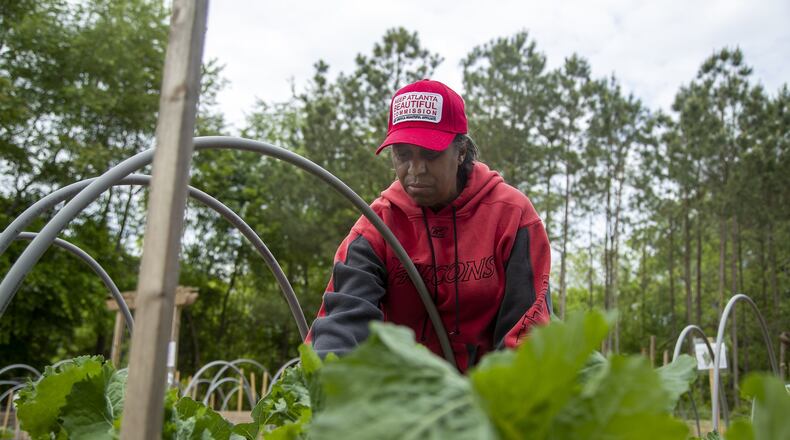As coronavirus cases surged and refrigerators emptied, Mike McCord’s thoughts roamed Atlanta’s food forest.
"Are we going to have to stay home and are all the plants going to die?" said McCord, ranger for the Urban Food Forest at Browns Mill Park. Just last year, the city-owned communal farm made headlines as the largest in the United States, providing Atlanta residents with access to fresh food and a way to grow their own crops.
The 7-acre food forest in southeast Atlanta is maintained by Trees Atlanta. Once swarming with volunteers, it’s now tended by just three people working one day each week. In addition to practicing social distancing, volunteers must also bring their own masks, gloves, and sanitized garden tools to avoid unknowingly spreading the virus.
One key concern has been residents picking crops from the community garden before they were ready to harvest. But the little that’s grown has been eaten by deer.
“When the pandemic started, there was really nothing out here. So things are just starting to come in,” said Rose Mary Griffin, the forest’s assistant community garden manager. “Right now, the two-legged problem is not ours. It’s the four-legged problem. The deer are eating stuff faster than we can plant it. But we’ve put out some repellents and we’re going to get some deer netting.”
The site has been used to teach residents how to manage their own gardens. There are fewer visitors since shelter-in-place orders were enacted, but McCord said the disruption to the city’s agriculture system and food production may result in more people creating their own gardens.
“This is why a food forest and community garden are essential to a city food structure so that we do have produce,” he said. “We have educated our visitors about when to grow things. They can look at the food forest for what they can do at their home garden.”
RELATED COVERAGE:
Georgia Tech logistics professor Alan Erera, who studies food supply chains, said the virus probably won’t change how most people get their food. He said grocers will likely diversify their meat and produce providers so that they aren’t relying on one large supplier to meet demand.
Atlantans don’t need to become urban farmers, he said.
“I don’t think this pandemic is the wake up to force people to do it,” Erera said. “We all are going to have similar access to fresh food that we had previously. That said, I think more people are thinking about how they get food and how they eat, and it might lead to more people experimenting with growing fresh food and growing gardens.”
Some residents who frequented the forest before the pandemic are old hands at tilling the soil. James Sanford has volunteered at the forest but grows food at home, too. “In the summertime, I always keep me a small garden. I usually keep me some greens, cucumbers, and zucchini,” adding he gets his eggs from his five chickens.
There are other ways to help assure people have enough to eat.
Credit: Alyssa Pointer
Credit: Alyssa Pointer
Neighborhood group Friends of the Urban Food Forest worked with southeast Atlanta church Bible Way Ministries International to distribute $100 gift cards to 550 residents. The group also hopes to create nutrition and exercise videos for senior residents, a vulnerable group during the pandemic.
For Norwood Manor resident Sharon Jenkins, 71, who cares for her 5- and 9-year-old grandsons, the gift card came at the right time: “We just so happened to hit Target at the time they had toilet tissue,” she said. “We were able to get a couple of cans of disinfectant spray.” She also purchased some fresh and frozen produce.
Jenkins had been a regular visitor of the food forest, but since the shelter-in-place order, she’s been indoors.
“I’m used to cooking fresh veggies because that’s how I grew up: the greens, corn, and cutting up fresh fruit,” she said. “I do buy other prepared foods as well, but I’m very happy when I can get my hands on fresh veggies.”
Jenkins said the pandemic could be a way to get younger people involved in growing their own food.
“My age group, we’re used to growing fresh vegetables. Growing up in my community, we had cows, pigs, goats, and chickens. That’s kind of lost right now. I’m sure we could reintroduce that to them,” she said.
She’s hoping Friends of the Food Forest can post their exercise videos soon: “Oh my God, I need it so bad now, since you really can’t go outside much,” she said between laughs. “I know everyone is saying this, but the refrigerator is my best friend.”
About the Author
Keep Reading
The Latest
Featured



